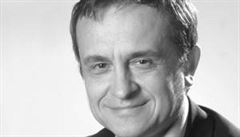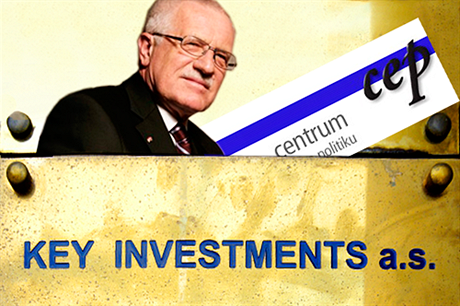The most famous right-wing think tank in the Czech Republic, the Center for Economics and Politics (CEP), which Václav Klaus founded in 1998 after stepping down as prime minister, entrusted money to Key Investments, an opaque brokerage that has since lost its license and is under investigation by the central bank. Although the firm has always concealed its clients, Czech Position has learned that CEP invested with Key Investments starting in 2002.
While declining to specify how much money was invested with the brokerage, think tank director since February 2009, Jan Skopeček and his predecessor, Petr Mach (2003 to 2008), have both confirmed the business relationship with Key Investments. According to CEP’s annual report for 2008, the think tank had an account balance of Kč 11.5 million, and likely had a comparable sum invested with the brokerage at some point. (Its annual reports are only available for 2006, 2007 and 2008.)
The Key Investments scandal erupted last spring. In short, the Prague districts of 6, 10 and 13 — all of which have mayors from the Civic Democrats (ODS) — entrusted the brokerage with nearly Kč 1 billion (more than $50 million) of taxpayers’ money, which put it into high-risk or illiquid bonds (such as of Via Chem Group and E Side Property, the owner of the Slavia Prague football club’s Eden stadium) and into shares in Spolchemie (Spolku pro chemickou a hutní výrobu), which hasn’t been traded since 2007.
The auditor of the brokerage to which the administrations of Prague 6, 10 and 13 entrusted almost Kč 1 billion, Auditing Dykast, also works for the firm E Side Property, whose bonds Key Investments purchased for the portfolios of the Prague districts. Although it was public money, there was no public oversight of the investments. After nearly half a year of foot-dragging, Prague Mayor Bohuslav Svoboda (ODS) finally decided in July 2011 to launch an internal investigation as to how the councils of Prague 6, 10 and 13 invested taxpayer money.
But whereas the Prague districts in question — despite heavy media scrutiny and political pressure — have been unable to recover their money from Key Investments, the Czech president’s think tank, unsurprisingly, received its investment back in full, though it was put into the very same bonds as was the money of Prague 6 and 10.
Who bought the bonds — and at what price — to allow CEP to get back its millions, its director Jan Skopeček refuses to say. He also declines to reveal the structure of the portfolio, which is a pity. If the portfolio were made public, citizens of Prague 6 and 10, as well as those from the town of Sokolov and other municipalities, could also identify the bonds that are “sellable.”
Center for Economics and Policy (CEP)
Václav Klaus — who on the CEP website is described as the “father of the Czech economic transformation from a communist society into a democracy based on free enterprise” — founded the think tank in 1998. Its stated mission is to “to formulate and promote public policies based on the principles of free enterprise, limited government, individual freedom and the Trans-Atlantic relationship.”
The original board consisted of Klaus (an economist), professor of medicine Vratislav Schreiber, and ODS senator Richard Salzmann (former CEO of Komerční banka). In 2003, following new elections, Klaus remained at the head while journalist Karel Steigerwald and Jiří Weigl (the Czech president’s current chancellor) joined the board — which always appointed a director, who in reality never actually led the think tank. Neither did board membership bring any rewards, benefits or executive powers.
At CEP’s last executive board meeting in late 2011, Vladislav Jakl (another advisor to Klaus at Prague Castle and head of his office’s political office) replaced Weigl, who was given a new task by the president, whose second term as head of state ends in March 2013: establish the Václav Klaus Institute, a new entity that would absorb the CEP.
Why Key Investments?
There can be no doubt that Václav Klaus knew that CEP had entrusted money to Key Investments, and Weigl may have been behind the move: he was director of the London shell company Efficient Investments — the parent company of Key Investments — for all of 2002 and for the first few months of 2003, as is clear from an extract from the UK commercial register.
Who owned Efficient Investments is, however, still unclear, and Weigl, if he knows, isn’t saying. “As to your questions received by email on Dec. 21, 2011, the chancellor replies that he is not a member of the CEP board and does not have this information at his disposal,” his assistant, Helena Jurčíková, told Czech Position.
What is known is that until three months before he was appointed by Klaus to the Czech National Bank (ČNB) board, Robert Holman worked for Efficient Investments. In late 2002, the company set up a country office in Prague with Holman its sole employee; he left in November 2004 and joined the ČNB board on Feb. 13, 2005 (he was replaced by economist Lubomír Lízal at the close of his six-year term).
Petr Mach, the think tank’s longtime former director, was more forthcoming. “CEP, from the beginning of its existence, used term deposits with banks, and later when interest earned on bank deposits fell, began to make use of alternative investments through the company SI Asset Management, which was later renamed Key Investments,” Mach, who headed CEP from 2003 to 2008 and is chairman of the small Party of Free Citizens (SSO), told Czech Position.
His successor, the young economist Jan Skopeček, who replied to Czech Position’s questions two weeks after they were submitted, said the contract with Key Investments to manage the securities was signed in 2002. Although he declined to disclose the exact date, it apparently occurred when Weigl was head of Essential Investments.
“CEP used Key Investments to manage and exploit their funds, which came exclusively from the donations of private persons, companies or the think tank’s revenues [from the sale of publications and subscriptions]. At the same time, Key Investments was not the only financial institution that CEP used to manage its financial resources. … The amount added or withdrawn from our account at Key Investments depended on how much income CEP had in a given time,” said Skopeček, adding that the contractual relationship went smoothly and the brokerage always kept the director of CEP informed about the management (deposit, withdrawal, etc.) of funds.
Why CEP and not the other investors?
“We had guidance on the sale of securities in the portfolio and the transfer of funds to our current account was made after reports appeared in the media about the problems of this company [Key Investments] as regards settlements with some of their clients. In the course of 2011, we received part of our investment back in a number of payments. The remainder should be settled in the coming weeks,” Skopeček told Czech Position.
Beyond saying “it consisted of bonds,” the CEP director again declined to state the exact sums involved or the specific composition of its portfolio with Key Investments. “According to our investment strategy, it was not permissible to buy shares with our invested resources. The portfolio changed over time and also contained bonds about which are publicly discussed in the Key Investments case,” he said, in an apparent reference to Via Chem Group or E Side Property.
Whatever the case, they could likely be categorized as junk bonds or high-risk securities.“As we invest our own funds and not taxpayer money, we do not consider it necessary to make public further details about our investments,” Skopeček said.
Orwell and Key Investment clients
The mother of all questions, then, is how is it possible that Key Investments found a buyer for the otherwise unsellable securities that CEP had in its portfolio, when Prague districts 6 and 10 and Sokolov have claimed they have been unable to recover their money. With this dodgy brokerage — into which Martin Kocourek (ODS), the former industry and trade minister also invested millions to “divert” at least part of his sizable assets from his estranged wife during divorce proceedings — we find ourselves in an Orwellian world: All clients are equal, but some are more equal than others.
Is it the relatively small investment and the prominence of the investor (ultimately, Klaus)? “Given the size of CEP, the volume of funds invested was much lower than the amounts that some city districts are publicly speculated to have invested,” Skopeček told Czech Position. Speculation? Here are the facts:
Until about 2008, Key Investments appeared to be working well for its clients, who saw their portfolios appreciate in value and were promptly returned their investments when asked to do so. Problems started becoming evident in 2009, when it emerged that Daniel Brzkovský was among the brokerage’s owners (with a 31 percent stake).
Who really controlled — and controls — Key Investments, however, is a matter of speculation — many media believe controversial lawyer and financier Petr Sisák, who had and may still have a majority stakes in Via Chem Group and E Side Property, to be among them. Key Investments bought junk or illiquid bonds in the two opaque companies with the nearly Kč 1 billion of Prague 6, 10 and 13 money, and also sunk funds from smaller municipalities into them.
While Prague 13, ruled by Mayor David Vodrážka (ODS), got its Kč 200 million back some six months ago under mysterious circumstances — through lawyer Jan Pacovský — the other districts of the Czech capital have nothing to show for their demands but junk and illiquid bonds. Perhaps they should consult Klaus and the CEP for advice.


